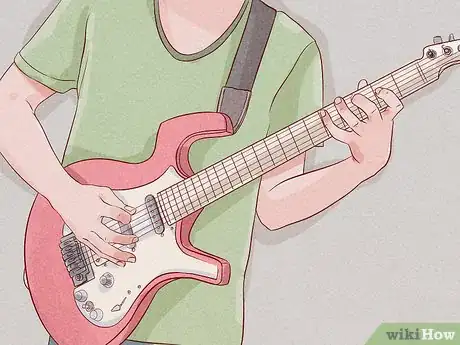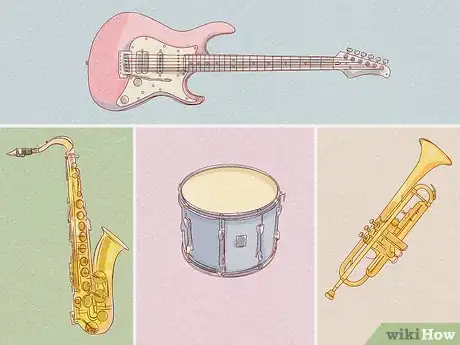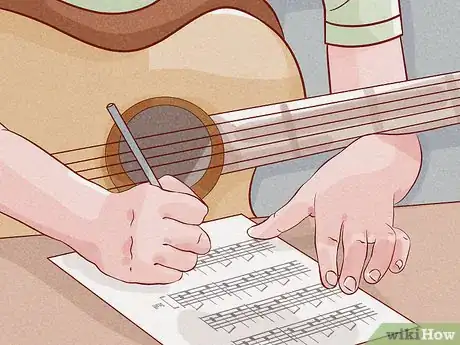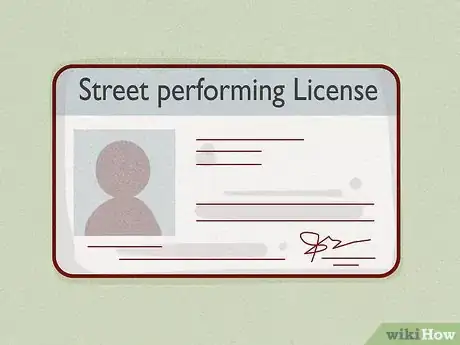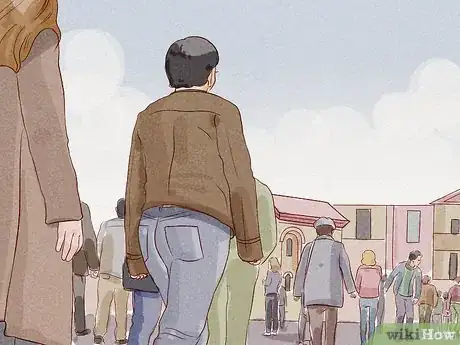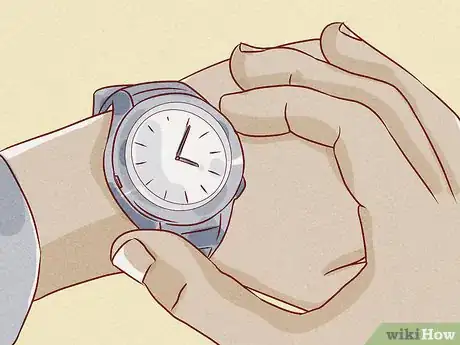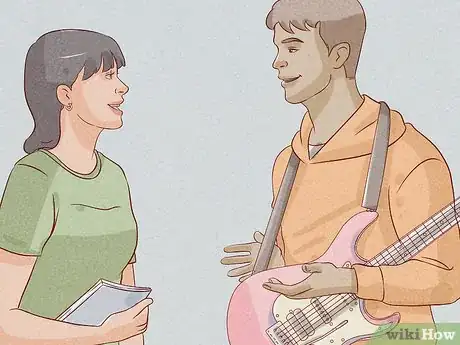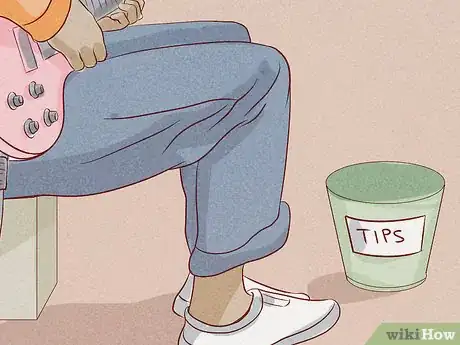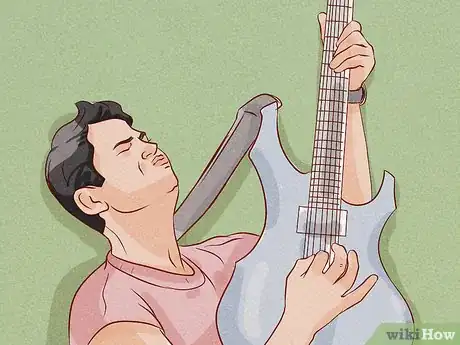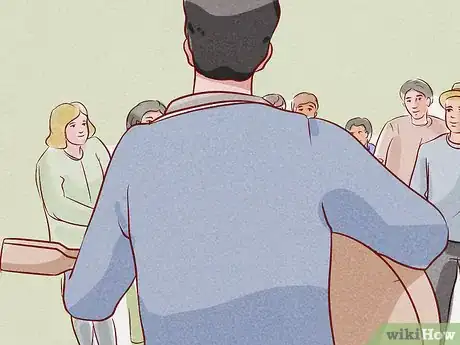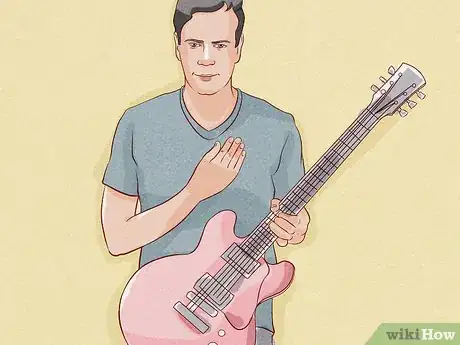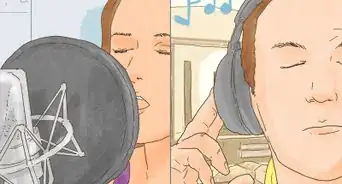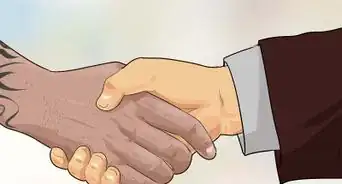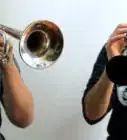This article was co-authored by wikiHow staff writer, Hunter Rising. Hunter Rising is a wikiHow Staff Writer based in Los Angeles. He has more than three years of experience writing for and working with wikiHow. Hunter holds a BFA in Entertainment Design from the University of Wisconsin - Stout and a Minor in English Writing.
wikiHow marks an article as reader-approved once it receives enough positive feedback. In this case, 86% of readers who voted found the article helpful, earning it our reader-approved status.
This article has been viewed 232,062 times.
Learn more...
Playing music on the street is a great way to earn money on the side and have fun doing it. On a night with a lot of foot traffic, you can make close to $100 USD if the crowd likes you. When you want to start performing, choose an instrument that's loud enough for people to hear and learn songs they can sing along to. After you find a place to perform, set up for the crowd and start playing your tunes.
Steps
Learning the Music
-
1Choose an instrument that you already play for your performance. People on the street are more likely to stop if you're playing an instrument well and can make it sound good. If you already know how to play a specific instrument, then focus your time and energy practicing your technique so you can get a better sound and play more fluidly. Try different playing techniques so you can continue to learn and master your instrument.[1]
- You can play music on the street with any instrument you want as long as you're able to play it well.
-
2Play a loud instrument so people can hear you over other noises. Smaller instruments, like the ukulele and violin, may not cut through the sound of a large crowd or a busy street so it may be difficult to hear. If you don't already play an instrument, find something that makes a loud noise, such as a trumpet, saxophone, drum, or electric guitar. Learn the instrument as well as you can so you can perform well when you find a place to set up.[2]
- If you're unfamiliar with the instrument, consider taking lessons so you can learn proper techniques.
Tip: If you don't have a loud instrument, invest in a microphone or amp so it's louder when you perform.
Advertisement -
3Sing if you don't know how to play an instrument. If you can't play an instrument and aren't able to find one, you can always sing instead. Look for a microphone and a small amp you can use while you're performing so your voice stands out from the rest of the crowd. Practice singing your favorite songs as well as scales so you can improve your vocal control and technique.
- You don't need a microphone to sing on the street if you already have a loud and strong voice.
- See if other performers want to get together so you can form a street band.
-
4Learn popular music that a lot of people will recognize. Popular music is easily recognizable and makes it easier for a crowd to jam along with you. See what songs are currently popular on the radio so you can find the chords and lyrics for them. Look for classic songs that many people would know as well, such as hits from the 80s and 90s, so people can sing along and grow more interested in your performance.[3]
- If you're playing a percussion instrument like drums, then you may not be able to play popular music as well as someone who can play guitar or sing. Instead, you may practice difficult rhythms from songs you already know or play your drums along to music in the background.
-
5Plan at least an hour of songs to play so your material stays fresh. When people hear you play the same song over and over again, they're less likely to watch or tip. Make sure you prepare a variety of songs to play so you're able to keep playing without repeating any. Write down all of the songs you know and organize them however you want so they flow well into one another.[4]
- It's okay to start repeating songs if the crowd you originally played them for has already left.
Finding the Right Location
-
1Get a permit or license from the city if it requires one. Some cities require a busking, or street performing, license before you're able to play your instrument legally public. Check your local laws online to see if you need to fill out an application for the permit. Submit the application along with the payment required and wait to hear back from the city. If they approve your permit, then you can start playing whenever you want to.[5]
- Some cities don't require busking licenses at all so you're able to play without getting in any trouble.
- You may need to renew your permit yearly, but it depends on where you live.
- Don't play your instrument on the street if you haven't gotten a permit since you could get fined.
-
2Choose a busy place in your city to set up so the most people can hear you. Check for areas that have a lot of tourists, bars, restaurants, or people walking around since they'll have the most foot traffic. Scope out a few different places around the city so you have options to choose from and can try out new locations. Write down a few of the locations and how many performers you see in the area so you can figure out what sort of competition you have.[6]
- Set up your space away from other street performers so you don't interfere with them.
Tip: Set up near a crosswalk so people have to listen to you while they wait.[7]
-
3Wait until evenings or weekends to perform to get the most foot traffic. Streets don't usually get busy throughout the day unless it's a weekend or after normal work hours. Wait until at least 4 or 5 PM on the weekdays before choosing a place to set up so you don't waste time on empty streets. Depending on the businesses in your area, you may be able to have foot traffic late in the night. Check out the busy places in your city at different times during the weekends and evenings to see when they're the busiest.[8]
- Days before and after holidays may also be busy since people may have off of work or school.
-
4Ask businesses if it's okay for you to play in front of them. Even though you have a permit from the city, be courteous to the businesses you set up next to and ask them if they're okay with you performing. If they are okay with your performance, then you can set up outside so you don't block the door or the rest of the sidewalk. If they aren't okay with it, then smile and thank them anyway before finding a new location.[9]
- Don't argue with any businesses if they don't want you to play so you don't get in any trouble.
- If you need to plug in any microphones or amps, ask if they have an available outlet that you could plug into.
Performing Your Set
-
1Place a large tray or bucket in front of you for tips. Use a container that's large enough to hold your money throughout the night so it doesn't overflow. Make sure the tray is deep enough where money won't blow away in the wind. Place the tray in front of the area where you're performing and label it “Tips” or something similar so people know where to put their money.[10]
- Put a bit of cash in your container before you play to make it look like others have already seen you perform so more people are likely to tip you.
- Remove any large bills or big wads of cash as soon as you can so it's less likely to get stolen.
-
2Play your music loudly so people are drawn to your performance. Stand up straight so you're visible while you're performing. Turn up the volume or play the instrument as loud as possible to cut through the noise of the crowd and make your music more prominent. Check that you stay in tune and sound good from a distance so people are more likely to be drawn toward you.[11]
- Singing or playing loudly may put stress on your voice and instrument, so take frequent breaks and stay hydrated.
Tip: Have a helper stand 20–30 feet (6.1–9.1 m) away to see if your music is audible from further away.
-
3Take popular song requests if you know a lot of songs. If you know a lot of popular songs, interact with your crowd to see what they want to hear next. Listen to their suggestions and songs that you're able to play and haven't done recently in your set. Be enthusiastic about the song while you're playing it and involve the crowd while you sing to get them excited and more likely to leave a tip.[12]
- Don't ask for suggestions from the audience if you do not know a lot of songs.
-
4Thank your audience no matter how the performance went. Once you finish a song, thank the crowd for listening to your music and let you know that you appreciate them spending time listening to you. Let the crowd know that you have a container for tips if they enjoyed your performance. Tell them that you're going to be playing for a little longer if they want to stay and listen.[13]
- Always say thank you when a person gives you a tip to show that you're grateful.
Community Q&A
-
QuestionWill people hear my violin?
 Rebekah BastienCommunity AnswerDepending on the area, you may or may not be able to be heard. If you feel that your music is drowned out, set up a microphone to help projection your sound.
Rebekah BastienCommunity AnswerDepending on the area, you may or may not be able to be heard. If you feel that your music is drowned out, set up a microphone to help projection your sound. -
QuestionWhat should I do if it is cold out?
 Community AnswerMost instruments freeze up in the cold and get out of tune, so warm up before going outside to play.
Community AnswerMost instruments freeze up in the cold and get out of tune, so warm up before going outside to play. -
QuestionCan I play in a town square?
 Community AnswerMost likely you can, but make sure to check with the city hall to be sure it is legal to do so. It's also a good idea to make surrounding businesses aware of your presence.
Community AnswerMost likely you can, but make sure to check with the city hall to be sure it is legal to do so. It's also a good idea to make surrounding businesses aware of your presence.
Warnings
- Always be respectful if you're asked to leave a location so you don't get in trouble.⧼thumbs_response⧽
- Don't perform on the street without a permit if your city requires one since you may need to pay a fine otherwise.⧼thumbs_response⧽
References
- ↑ https://lewishowes.com/marketing/increase-sales-and-customers/
- ↑ http://blog.sonicbids.com/make-more-money-busking-with-these-7-street-performance-tips
- ↑ http://blog.sonicbids.com/make-more-money-busking-with-these-7-street-performance-tips
- ↑ http://money.com/money/3753898/how-much-street-performers-earn/
- ↑ https://finance.smgov.net/doing-business/business-license/street-performer-permit
- ↑ http://blog.sonicbids.com/make-more-money-busking-with-these-7-street-performance-tips
- ↑ http://money.com/money/3753898/how-much-street-performers-earn/
- ↑ http://money.com/money/3753898/how-much-street-performers-earn/
- ↑ https://lewishowes.com/marketing/increase-sales-and-customers/
- ↑ http://blog.sonicbids.com/make-more-money-busking-with-these-7-street-performance-tips
- ↑ http://blog.sonicbids.com/make-more-money-busking-with-these-7-street-performance-tips
- ↑ http://blog.sonicbids.com/make-more-money-busking-with-these-7-street-performance-tips
- ↑ https://lewishowes.com/marketing/increase-sales-and-customers/
